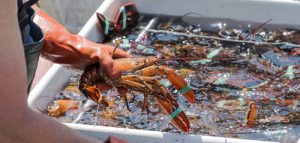
U.S. Sen. Susan Collins (R-ME) recently joined a bipartisan, bicameral effort with several Maine lawmakers to continue advocating for their home state’s lobstermen and women, who are working to meet new federal requirements by May 1 that are expected to increase their financial losses.
The lawmakers expressed “renewed urgency” in requesting a delay in the National Marine Fisheries Service’s (NMFS) implementation of the new Atlantic Large Whale Take Reduction Plan final rule, which requires U.S. lobster and Jonah crab fisheries to modify their gear by May 1, according to a Feb. 7 letter they sent to U.S. Commerce Secretary Gina Raimondo.
“The economic harm imposed by the gear conversion deadline will be severe, and the scarcity of required gear is making it difficult — if not impossible — for lobstermen to achieve timely compliance,” wrote Sen. Collins and her Maine colleagues, who included U.S. Sen. Angus King (I-ME), U.S. Reps. Chellie Pingree (D-ME) and Jared Golden (D-ME), and Maine Gov. Janet Mills (D).
The lawmakers called for the implementation date for gear conversion to be postponed from May 1 to July 1 and cited NMFS data showing that changing the compliance date would result in a potential increase in risk to whales of just 0.9 percent, while failure to delay the rule would cost the industry $7.3 million, according to their letter.
“Specifically, the rule cuts short a highly productive period for many lobstermen who will have to bring their gear ashore sooner than usual to make the required changes,” the lawmakers wrote. “Analysis has shown that extending the deadline by 60 days would present negligible additional risk to whales, but would meaningfully reduce the economic harm to the lobster fishery.”
Additionally, Sen. Collins and her colleagues outlined the challenges facing lobstermen and women trying to obtain compliant gear and highlighted what they called “contradictory guidance” from NMFS on the acceptability of using knots to create weak rope.
“As the May 1 compliance date approaches, lobstermen are working earnestly to conform to the new requirements and preparing to absorb anticipated losses,” they wrote. “They are encountering, however, a new obstacle that demands attention: a scarcity of the very materials they need to comply, including manufactured weak links and special weak rope.”
Sen. Collins and her colleagues noted that “this is a critical opportunity for NMFS to review updated information, demonstrate good faith, and bolster trust with stakeholders. It must not be overlooked.”
She also raised this issue with Secretary Raimondo during a Feb. 1 hearing, entitled “Expanding Broadband Access: Department of Commerce Broadband Programs in the Infrastructure Investment and Jobs Act,” held by the U.S. Senate Appropriations Commerce, Justice, Science, and Related Agencies Subcommittee.
Secretary Raimondo told Sen. Collins during the hearing that she takes this issue seriously and acknowledged that commercial fishing is a way of life and a livelihood for many families. But she also said that “NOAA is not permitted on its own to change the date from May 1 to July 1.”
The secretary also told Sen. Collins that her agency is trying to “help locate the gear as well as provide as much flexibility and assistance as we can.”
“This is a terrible problem for our state, and it just seems so unfair when our lobstermen and women are not the problem,” Sen. Collins responded. “[A]s you’ve rightly said, lobstering is an iconic industry in our state. It is a way of life. It’s multigenerational. Our lobstermen and women have always been extremely sensitive to the environment and good stewards of the resource, and it’s extremely frustrating.”



